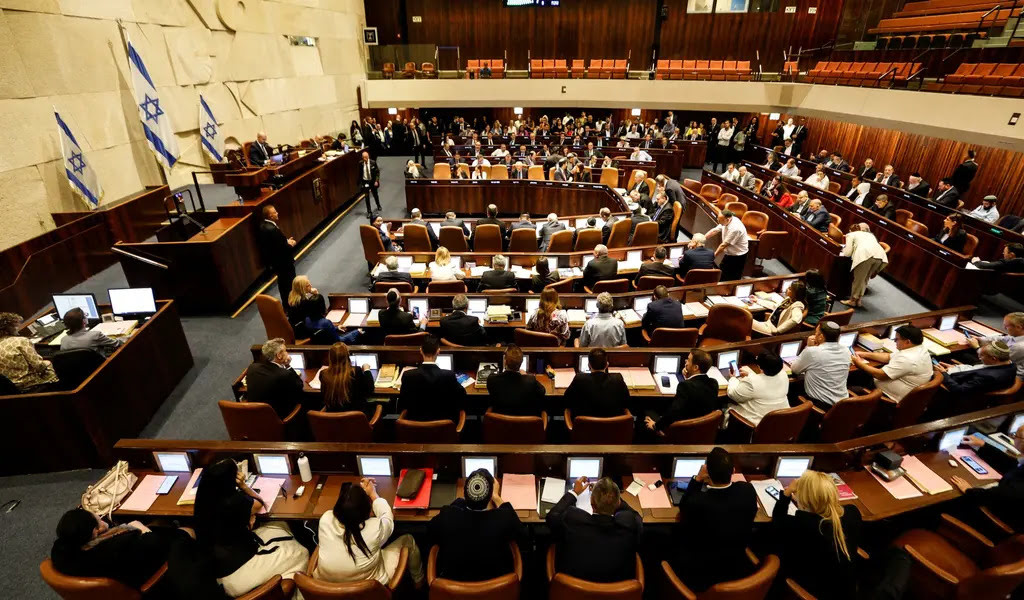(CTN NEWS) – On Monday, Israel’s parliament successfully approved the contentious “reasonableness” bill, marking a significant step in the government’s efforts to curtail the judiciary’s power.
This move has been met with strong opposition, with six months of protests and pressure from the United States, as it represents the most substantial transformation of the court system since the country’s establishment.
The bill secured a unanimous vote of 64-0, with all members of the ruling coalition supporting it. However, during the roll call vote, all opposition members decided to leave the chamber.
Despite rumors suggesting that Israeli Prime Minister Benjamin Netanyahu might reconsider the bill or make some concessions, the 73-year-old leader remained firm in his stance and proceeded with the vote.
Remarkably, he even arrived at the parliament, the Knesset, shortly after being discharged from the hospital.
Dubbed the “reasonableness” bill, it effectively removes the Supreme Court’s authority to deem government decisions as unreasonable.
This legislation constitutes the primary component of a comprehensive plan to reform the judiciary and has sparked a deep divide within the country, leading to hundreds of thousands of people taking to the streets in protest.
Here’s what you need to know about the situation.
Israel’s Controversial Judicial Overhaul: Balancing Powers or Threatening Democracy?
The judicial overhaul comprises a set of bills, and each of these bills must undergo three votes in the Knesset for approval.
Proponents of the overhaul, including Netanyahu and his supporters, argue that its purpose is to restore a proper balance of powers among the branches of government.
On the other hand, critics assert that it poses a significant threat to Israeli democracy and the independence of the judiciary.
The “reasonableness” doctrine, which is a central part of the proposed changes, is not exclusive to Israel’s judiciary. This principle is employed in several other countries, such as the United Kingdom, Canada, and Australia.
In those countries, this standard is frequently utilized by courts to assess the constitutionality or legality of a particular legislation. It empowers judges to ensure that decisions made by public officials are based on rational and justifiable grounds.
This year, the “reasonableness” standard came into play when Netanyahu removed Aryeh Deri, a key ally, from all ministerial positions.
This action followed an Israeli High Court ruling that deemed it unreasonable to appoint Deri to government positions due to his criminal convictions and his previous statement in court about retiring from public life.
Other aspects of the judicial overhaul aim to grant the right-wing government greater control over judge appointments and eliminate independent legal advisors from ministries.
However, these bills have not progressed as far in the legislative process as the “reasonableness” bill.
The prime minister and his supporters argue that the Supreme Court has become an insulated and elitist group that does not genuinely represent the interests of the Israeli people.
They believe the court has overstepped its boundaries by interfering in matters beyond its jurisdiction.
In defense of his plans, the prime minister has cited examples from countries like the United States, where politicians play a role in appointing and confirming federal judges.
Critics counter that Netanyahu is pushing the overhaul to safeguard himself from his ongoing corruption trial, where he faces charges of fraud, bribery, and breach of trust. The prime minister vehemently denies any wrongdoing.
Another bill, already approved in March, raises the bar for declaring a sitting prime minister unfit for office.
The bill restricts the reasons for such a declaration to physical or mental incapacity and mandates that either the prime minister themselves or two-thirds of the cabinet must vote in favor of the declaration.
Israel’s Judiciary Faces Historic Overhaul Amidst Strong Opposition and Economic Impact
If the overhaul is approved, it will mark the most significant and far-reaching transformation of Israel’s judiciary since its establishment in 1948.
Calls for changes to the judicial process have been present for some time, with individuals from various political backgrounds advocating for reforms in the past.
Israel, lacking a written constitution but relying on a series of quasi-constitutional basic laws, has a relatively robust Supreme Court, which supporters of the changes consider problematic.
However, the Supreme Court serves as the only mechanism to check the power of the Knesset and the government, given that the executive and legislative branches consistently remain under the control of the same governing coalition.
Critics argue that the proposed overhaul will effectively eliminate the sole avenue available to maintain checks and balances in the country’s governance.
They further caution that it will compromise the independence of the Israeli judiciary and have adverse effects on rights not explicitly protected in Israel’s basic laws, such as minority rights and freedom of expression.
Under Netanyahu’s leadership, Israel is governed by its most right-wing coalition in history, comprising both ultra-nationalist and ultra-religious parties. Certain members of the government have faced criticism for expressing extreme views.
According to polling conducted by the Israel Democracy Institute in February, the proposed changes have garnered support from only a minority of Israelis.
A vast majority, 72%, desire a compromise to be reached. Furthermore, 66% believe the Supreme Court should retain the power to strike down laws, and 63% of Israelis believe the current method of appointing judges should remain unchanged.
The bill has encountered strong opposition from millions of Israelis, including dozens of business leaders. Even Netanyahu’s own defense minister, Yoav Gallant, has repeatedly called for postponing the overhaul to pursue broader consensus.
Although Netanyahu threatened to dismiss Gallant earlier in the year for criticizing the overhaul, no action was taken.
To protest the bill’s passage, a group of 150 prominent Israeli companies went on strike on Monday.
Upon news of the new law, Israel’s main stock index, the TA-35, experienced a decline of over 2%. This index had been enjoying a recent rally, with a climb of more than 6% over the last month.
Additionally, the Israeli Shekel weakened against the dollar, dropping by just under 1%.
Israel’s Allies Express Concerns Over Proposed Judicial Overhaul
Israel’s allies, including the United States, have raised apprehensions regarding the proposed overhaul.
US President Joe Biden recently conveyed a message to Netanyahu through Thomas Friedman of the New York Times, warning that passing the overhaul without widespread consensus could jeopardize the US-Israeli relationship.
Biden emphasized the significance of the issue, acknowledging that Israelis hold strong opinions on the matter, as demonstrated by the enduring protest movement.
He stressed that the vibrancy of Israel’s democracy must remain at the heart of the bilateral relationship between the two nations.
Concerns have been raised by Israel’s allies, including the United States, in response to the proposed overhaul.
US President Joe Biden communicated a message to Netanyahu through Thomas Friedman of the New York Times, cautioning that if the overhaul is passed without broad consensus, it could potentially jeopardize the US-Israeli relationship.
Biden underscored the importance of the matter, recognizing the strength of opinions among Israelis, evident through the ongoing protest movement.
He emphasized that preserving the vibrancy of Israel’s democracy should be a central pillar of the bilateral relationship between the two countries.
Monday’s Bill Passage Intensifies Israel’s Internal Divide Amidst Warnings of Unrest and Constitutional Tensions
The passing of Monday’s bill could potentially deepen Israel’s domestic divide. Those opposing the bill have vowed not to sit idly, and the nation might witness labor strikes, military refusals, and even a constitutional crisis as a consequence.
The Histadrut, Israel’s umbrella labor union, issued a warning immediately after the bill’s approval, stating that continued unilateral legislation by the government would lead to severe consequences and prepared for a potential strike.
The Movement for Quality Government, an Israeli NGO, swiftly filed a petition with the Supreme Court, seeking to declare the “reasonableness” law unlawful.
They argued that it alters the fundamental structure of Israeli democracy and requested the court to halt its implementation until a ruling is made.
The Israel Bar Association is also gearing up for a legal challenge, as its executive, the Bar Council, has approved a petition to the Supreme Court aiming to overturn the “reasonableness” law once it passes.
The Bar Association further threatened to shut down as an act of protest against the perceived anti-democratic legislative process. This means that the Association would refrain from providing professional services to its members, though it wouldn’t result in lawyers going on strike.
Even Israel’s security establishment has been affected, with military members protesting the bill, and over 1,000 Air Force reservists threatening to halt their volunteering.
Former Prime Minister Yair Lapid urged the reservists, whose spirits were disheartened by the bill’s passage, not to refuse to serve until the Supreme Court reaches a verdict on the law.
Petitions to the Supreme Court to invalidate the law and block its implementation until a ruling are expected to be filed on Tuesday when the court opens.
If the Supreme Court declares the “unreasonableness” law itself unreasonable and void, annulling the law that diminishes the court’s powers, this could trigger a constitutional crisis, potentially pitting the government against the court.
RELATED CTN NEWS:
President Biden To Establish Emmett Till National Monument: Honoring A Tragic Legacy
Chinese President Xi Jinping To Host World Leaders At World University Games Opening In Chengdu







